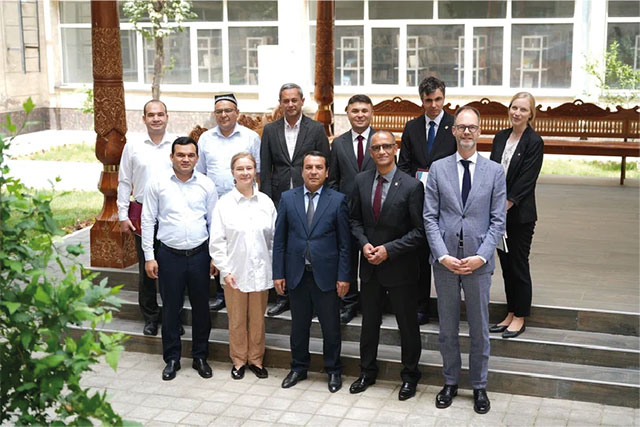
Blue Peace Central Asia Initiative Enters a New Phase of Development
Blue Peace Central Asia Initiative Enters a New Phase of Development
Tashkent, Uzbekistan (UzDaily.com) — A new stage of regional cooperation in water diplomacy is beginning in Central Asia. The Blue Peace Central Asia (BPCA) Initiative, aimed at ensuring effective and sustainable water management, is moving into its next phase with the signing of Memoranda of Understanding between the governments of Uzbekistan, Tajikistan, and the Swiss Confederation.
The signing ceremonies took place in Tashkent and Dushanbe, marking an important milestone in strengthening regional partnerships for water security.
The documents were signed by Tajikistan’s Minister of Energy and Water Resources Daler Juma, Uzbekistan’s Minister of Water Resources Shavkat Khamraev, and Christian Frutiger, Assistant Director-General and Head of the Global Cooperation Department of the Swiss Agency for Development and Cooperation (SDC).
Negotiations are underway to conclude similar agreements with Kyrgyzstan, Kazakhstan, and Turkmenistan, reflecting a shared commitment to comprehensive regional engagement.
The signed memoranda reaffirm Switzerland’s long-term commitment to supporting the Blue Peace Central Asia initiative, which has been implemented in the region since 2017. The project has become a flagship program of the Swiss Agency for Development and Cooperation (SDC) and is carried out by the International Water Management Institute (IWMI) in partnership with the International Union for Conservation of Nature (IUCN) and the Regional Environmental Centre for Central Asia (CAREC).
The new phase of BPCA, designed for the period from May 2025 to December 2029, aims to transform water from a potential source of conflict into a tool for trust-building, sustainable development, and regional stability.
Central Asia faces growing challenges in water management related to climate change, accelerated glacier melt, population growth, and rising water demand. The region’s two main rivers, the Amu Darya and the Syr Darya, cross multiple national borders, making interstate cooperation essential for equitable and efficient distribution of water resources.
The next stage of BPCA implementation will focus on three priority areas: strengthening hydrodiplomacy through evidence-based policy dialogue and confidence-building among countries; implementing pilot projects in small transboundary river basins to demonstrate the tangible benefits of cooperation; and developing the capacity of youth, women, and media representatives through educational and leadership programs, including the launch of a joint Master’s program in hydrodiplomacy.
Gender equality and youth engagement will remain cross-cutting principles of the initiative, ensuring an inclusive and sustainable approach to addressing the region’s water challenges.
BPCA will also continue its cooperation with national government bodies and regional working groups. Planned activities include the development of water quality and sanitation monitoring systems, climate strategies, innovative tools for water-energy cooperation, data modeling improvements, and the organization of high-level regional forums. Two pilot river basins will serve as platforms for joint management and the introduction of water-saving technologies, ecosystem restoration, and infrastructure development.
At the same time, regional mechanisms for technical coordination among Tajikistan, Uzbekistan, and Kazakhstan will continue to be supported. In August 2025, for instance, a ministerial meeting was held in Khujand to discuss the joint management of the Bahri Tojik reservoir—an example of the practical application of the Blue Peace principles.
The initiative also places special emphasis on human capital development. In partnership with leading universities across the region, a Master’s program in hydrodiplomacy will be launched, along with hackathons and programs supporting women working in the water sector. These efforts aim to foster a professional and inclusive community of experts in water resource management.
The Blue Peace Central Asia Initiative serves as a strategic platform integrating environmental, economic, and social priorities to achieve peace, sustainable development, and climate resilience. As part of the global Blue Peace movement, it connects Central Asia to international efforts aimed at strengthening trust, promoting dialogue, and advancing shared prosperity.